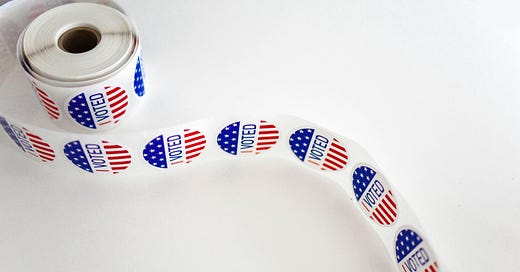You and I… we may have different opinions.
We may hold different perspectives about the economy or abortion or what constitutes competent leadership.
Yet, so many of us, regardless of our political views, are struggling with profound anxiety in the face of the upcoming U.S. elections. Even those outside of the U.S. are watching and waiting, aware that we are all interconnected and decisions made in the next few weeks will have rippling effects worldwide.
Divisiveness, bitterness, and misunderstanding prevent those with differences from communicating. After the election is over, we are still who we are, still have our daily responsibilities, still have our joys and sorrows. Our shared humanity bonds us to each other.
But the divisiveness must be healed.
When we sit with others, listen with curiosity and openness, and try to understand a different perspective, we come a bit closer to bridging the gap. According to the American Psychological Association, “one way to mitigate the divisiveness is to physically bring people together in safe, highly structured dialogue groups.”
The following are a sampling of organizations that offer guidance for bridging misunderstanding and healing divisiveness. Some of them offer support for families, schools, religious groups, businesses, or any other group or organization where conflicts arise.
Braver Angels promotes opportunities for dialogue among divergent groups and proposes to bring: “Americans together to bridge the partisan divide and strengthen our democratic republic.”
Princeton University’s Bridging Divides Initiative offers guidance, research support, and a list of state-wide organizations that provide conflict resolution training.
The Center for Nonviolent Communication proposes to “support the transformation of how we speak to ourselves and others, one empathic conversation at a time.” Their guidance is useful for even routine conversations.
The Institute for Civility works to “promote civility—in government, workplaces, schools, and anywhere people gather to live, learn, work, and play.”
As I take in the breathtaking fall foliage unfolding around me, I am ever aware of the (perhaps cliche, but still valid) inevitability of change. Meditation teacher Lewis Richmond offers a reminder that “everything changes, nothing lasts, and life goes on.”
All of us will survive the next election. Regardless of whether our “side” wins or loses, we can work to forge greater connections and understanding with others — even with those who seem so different.
Please share this vital list of information with others and let me know your thoughts about healing this divide in the comments section!
Disclaimer: Please note that my articles are for informational purposes only and are not to be taken as mental health or medical advice. If you are in need of personal guidance, please reach out to mental health professionals in your community. Please also note that I have no affiliation with the organizations listed above.





I've been hearing about people who, upon finding out that a relative, friend or even an acquaintance is on the "other side", completely stop talking to them! This is terrible. We can't let this election tear this country apart!
I do not know how to reason with people who follow a cult. How do we reason with somebody who is okay with supporting Nazi ideology?